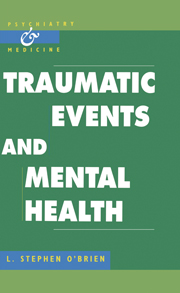Book contents
- Frontmatter
- Contents
- Foreword
- 1 Introduction and historical perspective
- 2 Normal reactions to trauma
- 3 Epidemiology of post-traumatic stress disorder and post-traumatic illness
- 4 Aetiology and predisposing factors
- 5 What constitutes a stressor?
- 6 Post-traumatic illness other than post-traumatic stress disorder
- 7 Diagnosis and assessment
- 8 Management and outcome of post-traumatic illness
- 9 Medicolegal aspects of post-traumatic illness
- 10 Prevention of post-traumatic illness
- 11 The way ahead – whither now?
- Index
1 - Introduction and historical perspective
Published online by Cambridge University Press: 05 May 2010
- Frontmatter
- Contents
- Foreword
- 1 Introduction and historical perspective
- 2 Normal reactions to trauma
- 3 Epidemiology of post-traumatic stress disorder and post-traumatic illness
- 4 Aetiology and predisposing factors
- 5 What constitutes a stressor?
- 6 Post-traumatic illness other than post-traumatic stress disorder
- 7 Diagnosis and assessment
- 8 Management and outcome of post-traumatic illness
- 9 Medicolegal aspects of post-traumatic illness
- 10 Prevention of post-traumatic illness
- 11 The way ahead – whither now?
- Index
Summary
This book is intended to be a brief but comprehensive textbook of the mental disorders or difficulties which can follow trauma and traumatic events. It is hard to argue with the suggestion that disasters, catastrophes, violence and traumatic incidents are all too common in modern society. Nobody would seriously suggest that previous centuries were idyllic peaceful times; natural disasters have always occurred. However, the sheer scale of the efforts which we have made to kill and maim each other this century has far outclassed the equally brutal but probably far less efficient activities of our forebears. Increased speed has its effect. Not only do we move around at greater and greater speeds, with the results of accidents being more horrific, but information moves around the world at faster and faster rates so that communication may be almost instantaneous. Some of the particular problems associated with the impact of trauma on the psyche could not have happened until the last decade. Only now can a mother sit at home and watch live footage of a shipwreck in which she believes that her son has drowned.
The frequency and diversity of traumatic events which may affect one person or thousands are such that the consequences of trauma will probably impinge upon all of us at some time. They will certainly impact upon the work of health and other service workers in general and mental health and social work professionals in particular.
- Type
- Chapter
- Information
- Traumatic Events and Mental Health , pp. 1 - 34Publisher: Cambridge University PressPrint publication year: 1998



